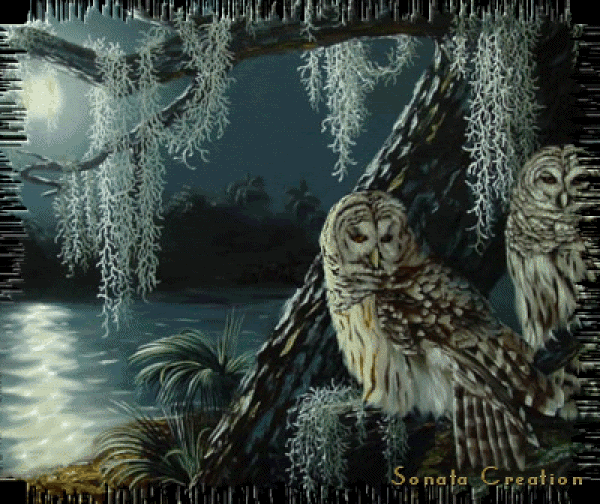 Submitted by PALLAS ATHENA -... on
Submitted by PALLAS ATHENA -... on

The Owl has a dual symbolism of wisdom and darkness, the latter meaning evil and death. They are symbolically associated with clairvoyance, astral projection and magick, and is oftentimes the medicine of sorcerers and witches, you are drawn to magickal practices. Those who have owl medicine will find that these night birds will tend to collect around you, even in daytime, because they recognise a kinship with you.
The two main symbolic characteristics of the Owl, its wisdom and its nocturnal activity-- have made it represent perception. Considering perception in a spiritual context, Owl medicine is related to psychism, occult matters, instincts, and clairvoyance-- the true ability to see what is happening around you.
The owl can see that which others cannot, which is the essence of true wisdom. Where others are deceived, Owl sees and knows what is there.
Owls are believed to have played a more prominent role in early Celtic cults, and could perhaps have derived from a more broadly based deity of a common European descent. Predating the Greek cult of Athene, for whom the owl was an animal attribute, were images of these mysterious birds in Celtic lands.
Owls are believed to be a sacred animal to the famed Cult of the Head. They often appear with human heads and with bovines, such as rams and bulls, all of which have been determined by scholars to be objects of this strange cult. In modern Scottish and Welsh languages, the owl, by the etymology of the word alone carries negative connotations of death and darkness. Then, in later Gallo-Roman times the Owl lost its cult significance, but has been linked to a Celtic goddess associated with fertility.
In Ancient Greek mythology the Owl was a creature sacred to Athena, Goddess of the night who represented wisdom. Athena, the Greek Goddess of Wisdom had a companion Owl on her shoulder, which revealed unseen truths to her. Owl had the ability to light up Athena's blind side, enabling her to speak the whole truth, as opposed to only a half truth. The Ainu in Japan trust the Owl because it gives them notice of evil approaching. They revere the Owl, and believe it mediates between the Gods and men. The bird features prominently Celtic folklore where it is considered both to be sacred and to have magical powers, again because of its abilities in the dark. Zulus and other West African nations consider the bird a powerful influence in casting spells, and think that using parts of the owl gives great strength to a person involved with magical incantations.
To the Welsh, the Owl is a night predator -- the only bird capable of defeating the swift falcon and then only at dusk, its time of power. The Owl symbolizes death and renewal, wisdom, moon magick, and initiations. Their Goddess Arianrhod shapeshifts into a large Owl, and through the great Owl-eyes, sees even into the darkness of the human subconscious and soul. She is said to move with strength and purpose through the night, her wings of comfort and healing spread to give solace to those who seek her. A star and moon Goddess, Arianrhod was also called the Silver Wheel because the dead were carried on her Oar Wheel to Emania (the Moon-land or land of death), which belonged to her as a deity of reincarnation and karma. The Mother aspect of the Triple Goddess in Wales, her palace was Caer Arianrhod (Aurora Borealis), or the secret center of each initiate's spiritual being.
However, many cultures have focused on the dark side of the Owl's symbolism. People have always been suspicious of the Owl because of man's fear of the dark, or night, and those things that might dwell there. In general, the hooting of an Owl is considered a portent of death or bad luck, and it may even prophesize death, as the death of Dido was foretold. It is a medical fact that most people die at night, and for that reason also the Owl has been seen as the messenger of death.
In the Middle East, China, and Japan, the Owl is considered as both a bad omen and an evil spirit. For Christians the Owl traditionally signifies the Devil, powers of evil, bad news, and destruction. Similarly, in the Old Testament the Owl is an unclean creature that stands alone as a figure of desolation. In an Australian Aboriginal myth the Owl is the messenger of bad news. Yama, the Verdic God of death, sometimes sent out the Owl as his emissary.
Indigenous peoples of the Americas consider the Owl to be the Night Eagle because it is silent and deadly in flight, and is a solitary bird with all-seeing eyes. The Owl is generally regarded as a bird of sorcerers because of its association with--and abilities in--the dark. It symbolizes deception and silent observation because it flies noiselessly. The Owl is feared by peoples who believe that the death warning is in its hoot.
In the Navajo belief system, the Owl is the envoy of the supernatural world and earth-bound spirits. The Pawnee understand the Owl as the Chief of the Night and believe that it affords protection. The Cherokee honor the bird as sacred because of its night-time vision, and wish to draw that power to themselves to see in the dark.
http://www.thewhitegoddess.co.uk/articles/mythology_folklore/owls.asp
- 2500 reads